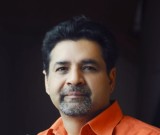By Agha Iqrar Haroon

When my flight was landing at the strip of Astana Airport on my way back to Islamabad from Baku, I had several questions in my mind. It was my first visit to new city of Astana as I had been entering in this country through Almaty — the former capital of Kazakhstan. My first visit to Almaty was in 1993, second in 1997 and third was in 1999.
The list of questions in my mind include; would I observer same hospitality among Kazakh people that I had been enjoying in the past? Does new city of Astana posses warmness of Kazakh culture or it is just a mega city without being an icon of Kazakh interfaith and inter-ethnic warm?
It is pertinent to mention that the republic of Kazakhstan is one of a few countries in post-Soviet territories that managed to avoid interethnic clashes and conflicts during transitional period between fall of USSR and emergence of new independent states.
Today, Kazakhstan is an excellent example of coexistence of several multi-ethnic groups working together for prosperity of this young country.
After the collapse of Soviet Union, all of its former countries experienced a burst of ethnic self-identity. The burst was accompanied by a wave of hostility towards non-locals and towards Russian-speaking population. This caused a massive outflow of non-locals from new states of Uzbekistan, Tajikistan, Turkmenistan and Kyrgyzstan. Russians, Germans, Polish, Ukrainians and other flew away from Uzbekistan, Tajikistan, Turkmenistan and Kyrgyzstan in just one decade after independence of cited countries. However, Kazakhstan was, perhaps, the only exception where the Father of Nation — President Nursultan Nazarbayev — acted swiftly after initial population outflow and built his country on the philosophy of “One Nation” by providing love and respect to non-locals; therefore, many of those who left came back to Kazakhstan due to “policy of multiculturalism” introduced by President Nursultan Nazarbayev.
Up to this day Russian language plays a great role of an interethnic language in Kazakhstan – almost half of the population still does not speak “Kazakh” — the official language of Kazakhstan. However, the official language is not being enforced harshly over people; the government gradually implements it into the public consciousness by actively teaching it in schools and universities.
Thus, almost 90% of graduates today have knowledge of Kazakh that is sufficient for everyday communication and holding positions in the public service, a sphere where Kazakh language became mandatory just a few years ago.
According to the governmental programme, 95% of the population will speak Kazakh at the level of everyday communication by 2020. To assist that goal, numerous Kazakh language centres (most of which are free or very cheap to attend) are being introduced everywhere in the country.
The languages and cultures of more than 140 nationalities that inhabit Kazakhstan are being freely developed along with the traditional Kazakh culture. The representatives of different ethnic groups residing in Kazakhstan are presented in an organization that is unique in its importance – the Assembly of People of Kazakhstan (APK). Today it is an advisory-deliberative structure under the President of the Republic of Kazakhstan. APK’s main goal is the realization of the government’s ethnical policies, providing socio-political stability in the country and improving the efficiency of cooperation between state and civil institutions in the field of interethnic relations.
Furthermore, a group of representatives from the Assembly, chosen at the organization’s congress meeting, are appointed MPs in the Parliament’s Lower Chamber “Majilis”. This is done to prevent monopolization of the Parliament by just one ethnicity and safeguard the opportunity to represent the interests of various ethnic groups of Kazakh population.
The Assembly supports the publishing of newspapers and magazines in 15 languages, radio broadcasting in 8 languages, and TV transmission in 7 languages. There are 88 schools in Kazakhstan in which the students are taught in Uzbek, Tajik, German, Uighur and Ukrainian languages.
In 108 schools across the country, the languages of 22 Kazakhstani ethnicities are being taught as a separate subject. There are also 195 specialized language centres where children and adults alike can learn the languages of 30 of Kazakhstan’s ethnic groups. Besides Russian and Kazakh theaters, there are four more national theaters – Uzbek, Uighur, Korean, and German.
Every year several dozen books are published in the languages of Kazakhstan’s different peoples. Mass celebrations of different ethnic holidays have become a happy tradition.
Continuation of efforts to maintain political stability in different ways including the harmonization of religious relations in the country is the main condition for Kazakhstan’s successful development.
As of today, there are more than 30 religious activities in Kazakhstan, the biggest being the traditional for Kazakhstan – Islam and Russian Orthodox. There is an incredible harmony in the relationship among these two religions and many others. The experts have noted a so-called “friendly religion” phenomenon in the country – Orthodox Christians wish joy to fellow Muslims on Kurban Ait while Muslims, in turn, felicitate Christians on Easter and Christmas.
It is worth noting that even though Kazakhstan supports spiritual development, it remains a secular state and opposes any attempts to establish religious exclusivity.
In general terms, keeping and nurturing interethnic stability is the foundation of the governmental policy in Kazakhstan. The idea of interethnic agreement and equality of all ethnic groups that call Kazakhstan their home is a legislative norm. Development and implementation of an effective system of measures for further harmonization of national and religious relations in the country, the fostering of tolerance and prevention of religious extremism in Kazakh society is a complex task shared by all governmental and non-governmental organizations.
The following fundamental paradigm governs the field of national relations of modern Kazakhstan – the growth of national consciousness of native Kazakhs can only happen when favorable conditions are created for the development of other ethnic groups at the same time.
The government keeps emphasizing the fact that Kazakhstan can be progressive only when the efforts and desires of the entire population are consolidated and taken into account.
“Interethnic harmony is considered as life-giving oxygen. We do not notice it when we breathe, we do it automatically, we just live. We must cherish our unity and ethnic harmony”, said the President of Kazakhstan Nursultan Nazarbayev in one of his traditional Addresses to the people of the country.
I wish to cite one popular quote of President Nazarbayev that can help to understand his viewpoint about the importance of interfaith harmony in any society. He said during one of his speeches to the Assembly:
“It is the family well-being, safety, shelter. Peace is the joy of fatherhood and motherhood, the health of our parents and the happiness of our children. Peace is a stable job, salary and confidence in the future. Peace and stability are a public property that needs to be strengthened and protected with our everyday efforts”.
Formidable success of Kazakhstan as a country that has been able to prevent ethnic and religious strife in a territory where 140 ethnic groups and many religions reside can be a model for study and imitation for countries those are facing multicultural crises.
Disclaimer:
The views and opinions expressed in this article/Opinion/Comment are those of the author and do not necessarily reflect the official policy or position of the Dispatch News Desk (DND). Assumptions made within the analysis are not reflective of the position of Dispatch News Desk.





